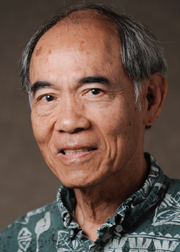|
Claiming the Roots of African Americans in the U.S. History of Educational Evaluation: A Personal and Collective Journey
by Stafford Hood, University of Illinois at Urbana-Champaign. Discussant: Morris Lai, University of Hawaiʻi at Mānoa
Minority and indigenous evaluators bring unique cultural perspectives that can increase the utility and validity of evaluations. Sadly, their contributions are rarely recognized in mainstream publications on the history of evaluation research, theory, and practice. This keynote by Dr. Stafford Hood provides a historical look at the presence and contributions of African American evaluators during the pre- Brown v. Board of Education era (1930-1950) as trailbreakers for culturally responsive evaluation. Dr. Hood’s address will be extended with a discussion by Dr. Morris Lai, who will include his reflections on Hawaiian cultural knowledge and traditions and the individuals who have influenced his own journey toward cultural responsiveness.
 Dr. Stafford Hood is the Sheila M. Miller Professor and Head of the Department of Curriculum and Instruction in the College of Education at the University of Illinois- Urbana/Champaign. His research and scholarly activities focus on the role of culture in educational assessment and on culturally-responsive approaches in program evaluation. He is the founding Co-Director of the national forum on the Relevance of Assessment and Culture in Evaluation. He was the principal investigator on National Science Foundation (NSF) grants and is involved with the American Indian Higher Education Consortium’s NSF funded “Building an Indigenous Framework for STEM Evaluation” project, the Robert Woods Johnson Foundations Evaluation Fellowship program, and the NSF Logic Model Study project. He has consulted on program evaluation and testing for the federal government, state departments of education, school districts, universities, foundations, and regional educational laboratories as well as in New Zealand and Ireland. He is President of the American Educational Research Association (AERA) SIG/Research Focus on Black Education. He previously served as the President of the American Educational Research Association (AERA) SIG/Research Focus on Black Education and as co-editor of its journal Educational Researcher, Features Section. He also currently serves on the editorial boards of the American Journal of Evaluation, New Directions for Evaluation, and Review of Educational Research. His professional experiences include Associate Dean for Research and a Professor of Psychology in Education in the College of Education at Arizona State University and Assessment Specialist and Program Evaluator for the Illinois State Board of Education. He holds a BA in Political Science, MA in Guidance and Counseling, and a PhD in Education.
Dr. Stafford Hood is the Sheila M. Miller Professor and Head of the Department of Curriculum and Instruction in the College of Education at the University of Illinois- Urbana/Champaign. His research and scholarly activities focus on the role of culture in educational assessment and on culturally-responsive approaches in program evaluation. He is the founding Co-Director of the national forum on the Relevance of Assessment and Culture in Evaluation. He was the principal investigator on National Science Foundation (NSF) grants and is involved with the American Indian Higher Education Consortium’s NSF funded “Building an Indigenous Framework for STEM Evaluation” project, the Robert Woods Johnson Foundations Evaluation Fellowship program, and the NSF Logic Model Study project. He has consulted on program evaluation and testing for the federal government, state departments of education, school districts, universities, foundations, and regional educational laboratories as well as in New Zealand and Ireland. He is President of the American Educational Research Association (AERA) SIG/Research Focus on Black Education. He previously served as the President of the American Educational Research Association (AERA) SIG/Research Focus on Black Education and as co-editor of its journal Educational Researcher, Features Section. He also currently serves on the editorial boards of the American Journal of Evaluation, New Directions for Evaluation, and Review of Educational Research. His professional experiences include Associate Dean for Research and a Professor of Psychology in Education in the College of Education at Arizona State University and Assessment Specialist and Program Evaluator for the Illinois State Board of Education. He holds a BA in Political Science, MA in Guidance and Counseling, and a PhD in Education.
 Dr. Morris Lai is head of the Research and Evaluation Section of the Curriculum, Research, and Development Group in the UHM College of Education, a Native Hawaiian scholar, and graduate faculty in the Department of Educational Psychology. With more than 36 years of state service and countless hours of selfless dedication to help scholars and educators alike, there is no questioning Lai’s knowledge and passion in preserving the Hawaiian language and culture. One of the best examples of his contributions is known as the “Laiberry” in the College of Education, a collection of nearly 4,000 books on Hawai‘i and Hawaiian education. Established in 2006 with a donation from his family, Lai began a quest in his spare time to locate as many related books as possible for the collection. The wonderful aspect of the Laiberry is that it is open to anyone, including students, to browse and borrow books. Just as substantial to all the accomplishments he has garnered, Lai has been a model “face” representing the university and exemplifies what a true community contributor should be.
Dr. Morris Lai is head of the Research and Evaluation Section of the Curriculum, Research, and Development Group in the UHM College of Education, a Native Hawaiian scholar, and graduate faculty in the Department of Educational Psychology. With more than 36 years of state service and countless hours of selfless dedication to help scholars and educators alike, there is no questioning Lai’s knowledge and passion in preserving the Hawaiian language and culture. One of the best examples of his contributions is known as the “Laiberry” in the College of Education, a collection of nearly 4,000 books on Hawai‘i and Hawaiian education. Established in 2006 with a donation from his family, Lai began a quest in his spare time to locate as many related books as possible for the collection. The wonderful aspect of the Laiberry is that it is open to anyone, including students, to browse and borrow books. Just as substantial to all the accomplishments he has garnered, Lai has been a model “face” representing the university and exemplifies what a true community contributor should be.
Communication: By Design or Default?
by Valerie Yontz, Associate Specialist and Practice Coordinator for the Office of Public Health Studies, University of Hawaiʻi at Mānoa
|
Dr. Valerie Yontz is currently an Associate Specialist and Practicum Coordinator for the Office of Public Health Studies, John A. Burns School of Medicine, University of Hawai‘i. She is a nurse, biologist, sociologist, and gerontologist and has worked in Liberia, Malaysia, Thailand, Missouri, Maine, Utah, and Illinois. Her professional experiences include being the Quality Assurance Officer and the Director of Public Housing Services for Kokua Kalihi Valley Health Center. She created many major components of KKV's Quality Improvement system. She was also the Health Services Director for Pohai Nani Good Samaritan’s Health Services. Dr. Yontz’s teaching areas include health services, cultural competency, health policy, gerontology, administration and planning. She has participated in community-based participatory research, and in research on aging issues, health disparities, and end-of-life decision-making. Dr. Yontz has a PhD in Sociology of Aging, a MPH in Gerontology, and a MS in Transcultural Nursing. |



 A communication process designed to be inclusive and slow to judgment prevents needless headaches. In evaluation, thoughtful, coordinated communication is particularly important because of multi-stakeholders—often community members and culturally-diverse partners. Dr. Yontz will review key components of the professional communication process and critique aspects for cultural effectiveness during professional face-to-face encounters, conference calls, and email exchanges. Using real examples, she will demonstrate how to move from default to designed communication.
A communication process designed to be inclusive and slow to judgment prevents needless headaches. In evaluation, thoughtful, coordinated communication is particularly important because of multi-stakeholders—often community members and culturally-diverse partners. Dr. Yontz will review key components of the professional communication process and critique aspects for cultural effectiveness during professional face-to-face encounters, conference calls, and email exchanges. Using real examples, she will demonstrate how to move from default to designed communication.